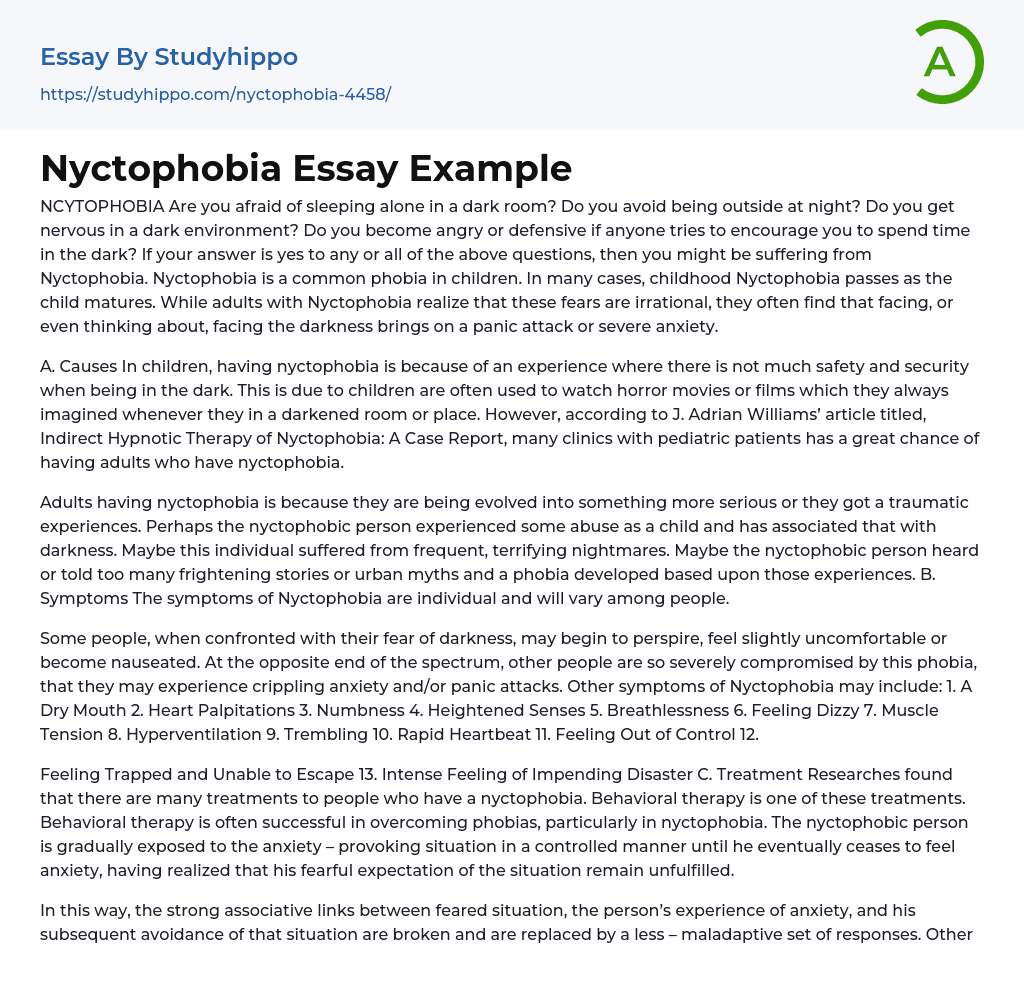- Are you afraid of sleeping alone in a dark room?
- Do you avoid being outside at night?
- Do you get nervous in a dark environment?
- Do you become angry or defensive if anyone tries to encourage you to spend time in the dark?
If your answer is yes to any or all of the above questions, then you might be suffering from Nyctophobia. Nyctophobia is a common phobia in children. In many cases, childhood Nyctophobia passes as the child matures. While adults with Nyctophobia realize that these fears are irrational, they often find that facing, or even thinking about, facing the darkness brings on a panic attack or severe anxiety.
Causes In children, having nyctophobia is because of an experience where there is not much safety and security when being in the dark. This is due to children are often used to watch horror movies or film
...s which they always imagined whenever they in a darkened room or place.
However, according to J. Adrian Williams’ article titled, Indirect Hypnotic Therapy of Nyctophobia: A Case Report, many clinics with pediatric patients has a great chance of having adults who have nyctophobia.
Adults having nyctophobia is because they are being evolved into something more serious or they got a traumatic experiences. Perhaps the nyctophobic person experienced some abuse as a child and has associated that with darkness. Maybe this individual suffered from frequent, terrifying nightmares. Maybe the nyctophobic person heard or told too many frightening stories or urban myths and a phobia developed based upon those experiences.
Symptoms The symptoms of Nyctophobia are individual and will vary among people.
Some people, when confronted with their fear of darkness, may begin to perspire
feel slightly uncomfortable or become nauseated. At the opposite end of the spectrum, other people are so severely compromised by this phobia, that they may experience crippling anxiety and/or panic attacks.
Other symptoms of Nyctophobia may include:
- A Dry Mouth
- Heart Palpitations
- Numbness
- Heightened Senses
- Breathlessness
- Feeling Dizzy
- Muscle Tension
- Hyperventilation
- Trembling
- Rapid Heartbeat
- Feeling Out of Control
- Feeling Trapped and Unable to Escape
- Intense Feeling of Impending Disaster C. Treatment
Researches found that there are many treatments to people who have a nyctophobia. Behavioral therapy is one of these treatments. Behavioral therapy is often successful in overcoming phobias, particularly in nyctophobia. The nyctophobic person is gradually exposed to the anxiety – provoking situation in a controlled manner until he eventually ceases to feel anxiety, having realized that his fearful expectation of the situation remain unfulfilled.
In this way, the strong associative links between feared situation, the person’s experience of anxiety, and his subsequent avoidance of that situation are broken and are replaced by a less – maladaptive set of responses.
Other treatments of nyctophobia include:
- Psychotherapy
- Hypnosis
- Talk therapy
- Anti-anxiety medications
There are also some tips that we can conclude that can be helpful for children to treat nyctophobia.
These are:
- Let children talk about their fears as sometimes they don’t know what exactly they are afraid of . By doing so, parents can know the severity of the fear and at the same time the child can confront his/her fear.
- Close to bedtime parents should see to it their children should not watch scary stuff on television. As after they go to bed in a dark room this may stimulate the imagination of the child.
- Children can be taught
how to deal with it. For example playing some soft music or leaving the night lamp on to help soothe them. A child can be given a flashlight so if they wake up in the middle of the night afraid they have some light.
- Tension essays
- Adhd essays
- Antisocial Personality Disorder essays
- Anxiety essays
- Bipolar Disorder essays
- Depression essays
- Depression And Anxiety essays
- Dyslexia essays
- Learning Disability essays
- Major Depressive Disorder essays
- Mental Disorder essays
- Mental Illness essays
- Psychosis essays
- Schizophrenia essays
- Stress essays
- Suicide essays
- Bias essays
- Big Five Personality Traits essays
- Body Image essays
- Mind essays
- Motivation essays
- Phobias essays
- Thought essays
- Abnormal Psychology essays
- Abraham Maslow essays
- Attachment Theory essays
- Authority essays
- Behaviorism essays
- Classical Conditioning essays
- Cognitive Psychology essays
- Counseling essays
- Developmental Psychology essays
- Educational Psychology essays
- Erik Erikson essays
- Family Therapy essays
- Jean Piaget essays
- Maslow's Hierarchy Of Needs essays
- Mental Health essays
- Operant Conditioning essays
- Personality Psychology essays
- Positive Psychology essays
- Psychoanalysis essays
- Psychotherapy essays
- Sigmund Freud essays
- Social Psychology essays
- Stanford Prison Experiment essays
- Supersize Me essays




